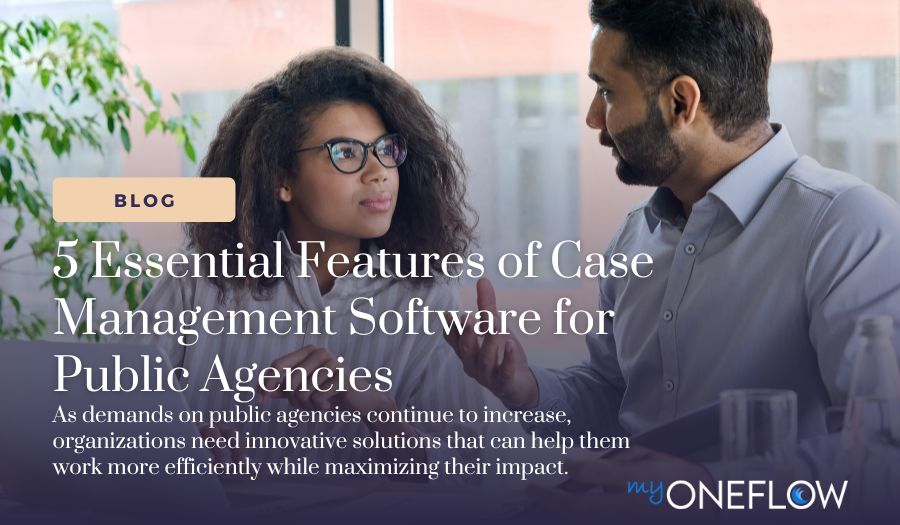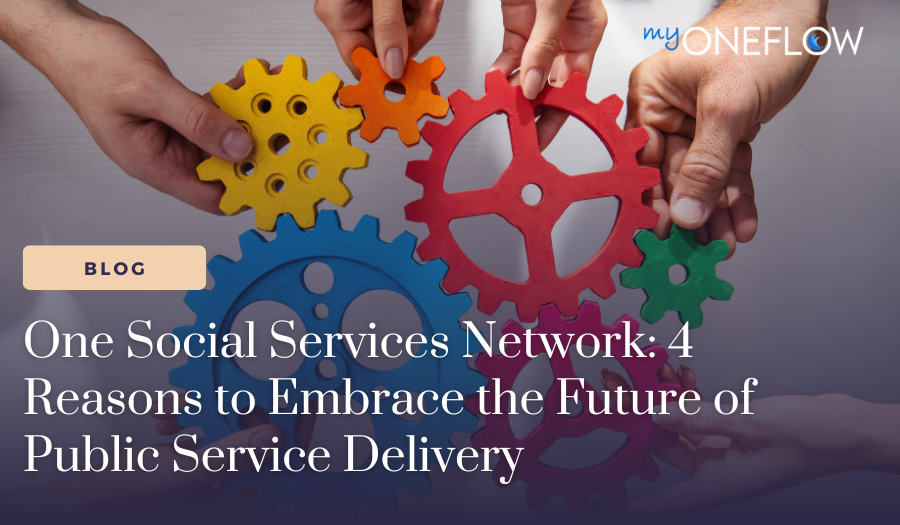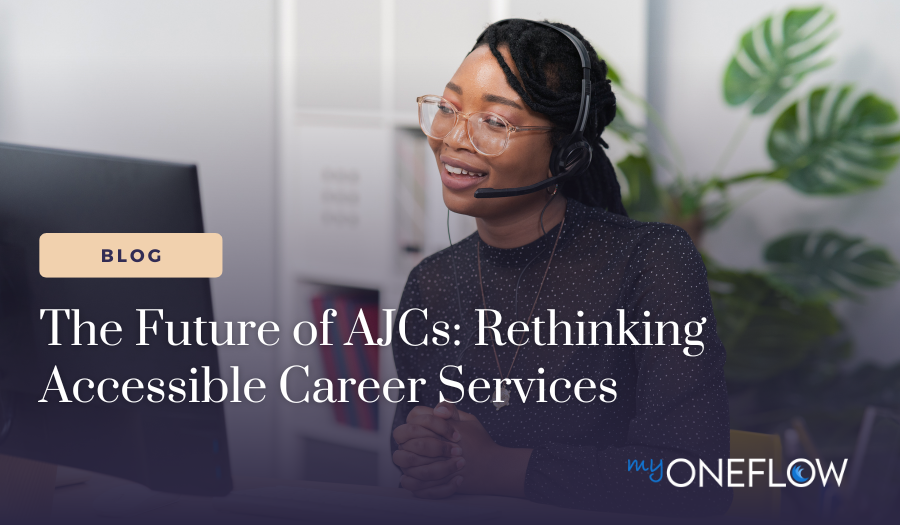4 Reasons to Embrace the Future of Public Service Delivery
Government social services are crucial in supporting individuals and families in need, providing resources and assistance to significantly improve...
5 min read
myOneFlow Staff Feb 29, 2024 11:16:00 AM

As the demands on public agencies continue to increase, they are in need of innovative solutions that can help them work smarter and more efficiently. One such solution is case management software, which can play a critical role in improving the delivery of public services. However, the success of this software depends on how well it aligns with the specific needs and requirements of the agency in question. By finding the right fit, agencies can unlock the full potential of case management software and achieve better outcomes for their communities.
This article will cover five critical features that public agencies should consider when choosing case management software. Making the right choice can improve productivity, while making the wrong one might lead to problems like wasted resources.
Whether you're new to using case management software or shopping between contracts, this guide will offer insights to help you make informed decisions that will modernize your agency and improve your service delivery.
When it comes to government case management software, being able to customize and adapt is nonnegotiable. Every agency has its way of doing things, so the software needs to be like a chameleon, changing colors to fit perfectly with each agency’s unique operations and goals.
Imagine if you could mold your software to do precisely what you need, how you need it. That's the beauty of configurability. It means not having to say, "Well, we can sort of do this." Instead, you get to say, "We've got this, and it works exactly how we want!" Whether it's the ability to configure workflows, reports, or user permissions, making the software reflect your organization boosts efficiency like nothing else.
As your agency evolves, your software should be right there, growing alongside you. Configurability is key to scalability. As you expand your reach and impact, your software can flex and stretch to accommodate that growth without breaking a sweat. No need to shop for new software every few years; you've got a system that adapts.
The world changes fast - new laws, new requirements, new ways of doing things. With a configurable case management system, you're always ready to pivot. Update your processes, tweak the data you track, or shift how you report outcomes without calling the IT cavalry. It's about staying agile and responsive, no matter what gets thrown your way.
Comprehensive reporting and analytics are critical for public agencies to understand their big-picture impact as well as granular details from their day-to-day operations. Imagine navigating a ship in the dark without a compass or a map; that's what making decisions without solid data feels like. Comprehensive reporting and analytics serve as your navigational tools, guiding your agency through the complexities of public service delivery. They allow you to analyze trends, identify areas for improvement, and measure the impact of your actions. With data-driven insights at your fingertips, you can make decisions that are not just reactive but proactively aligned with your agency's goals and the needs of the community you serve.
Real-time data analytics provide a live snapshot of your operations, enabling you to monitor cases as they progress, spot potential issues before they escalate, and allocate resources more effectively. Instead of being perpetually in firefighting mode, your agency can anticipate needs, prioritize cases based on urgency and complexity, and tailor services to achieve better outcomes. For instance, spotting patterns in case types or identifying bottlenecks in your processes can lead to strategic changes that enhance efficiency and effectiveness.
Moreover, analytics can play a pivotal role in policy formulation and evaluation. By understanding the impact of your initiatives, you can fine-tune your strategies to better serve your community. This continuous loop of feedback and improvement fosters a culture of excellence and innovation within public agencies.
For public agencies, sensitive data is part of the daily grind, and having ironclad security and being on the right side of governance policies isn't optional - it's essential. Think of your case management software as a fortress. Robust security features are the high walls, moat, and drawbridge protecting that fortress from invaders. We're talking encryption, secure user authentication, and regular security audits to keep everything tighter than Fort Knox. Why? Because the consequences of a breach—ranging from data theft to loss of public trust—are too dire to contemplate. You need peace of mind knowing your data is locked up tight.
Compliance isn't just about ticking boxes; it's about ensuring your software plays nice with government policies and regulations. Non-compliance doesn't just risk fines (which can be hefty); it jeopardizes your agency's reputation and operational integrity. Your software should help you stay compliant, not make it harder.
Inadequate security and non-compliance can lead to a world of hurt, including financial losses from fines and litigation, operational disruptions, and a damaged reputation that can take years to rebuild. This can be especially devastating in the public sector, where trust is your currency. Plus, there's the personal impact on the individuals whose data may have been compromised. It's a ripple effect of negativity.
Let's get into the nuts and bolts of why having software that plays well with others—aka seamless integration—is a big deal for public agencies. Imagine trying to solve a puzzle, but half the pieces are from a different set. That's what it's like when your case management software doesn't mesh with your existing systems. Seamless integration is all about making sure everything works together in harmony.
Public agencies often use a variety of systems and platforms to handle different tasks—finance, HR, document management, you name it. When your case management software can smoothly link up with these existing tools, data flows freely, processes speed up, and you cut down on manual work (and the errors that come with it). It’s all about creating a streamlined, efficient workflow that saves time and headaches.
Interoperability is a fancy way of saying "plays nice with others," and it's a game-changer. When your systems communicate and share information effortlessly, it opens up a world of possibilities. You can automate routine tasks, generate comprehensive reports with data from multiple sources, and provide better service to the public. Essentially, interoperability turns your separate systems into a well-oiled machine, where the whole is greater than the sum of its parts.
The perks of seamless integration extend beyond just making your day-to-day operations smoother. It also means better decision-making since you have access to more complete, up-to-date information. Advanced integrations help break down silos, improve efficiency, and ultimately enable you to deliver better, more cohesive services. For employees, it means less frustration and more focus on meaningful work. For the public, it means faster responses and more transparent services.
A user-friendly interface means everything flows better. It lets users get around the system easily, quickly find what they need, and finish tasks efficiently. This is super important in public agencies where you're always aiming to serve better and faster. A straightforward interface helps staff focus on what they do best, pumping up the agency's productivity.
The simpler the software, the faster your staff and clients can get the hang of it. If your interface is intuitive, you're looking at less time and fewer resources spent on training. This means the team can jump right into using the software effectively, making the whole adoption process smoother and quicker.
An easy-to-navigate interface means less time sweating over how to do things and more time actually doing them. It can take the load off by handling the repetitive stuff automatically, freeing up the team to tackle more complex tasks or spend more time helping clients one-on-one.
myOneFlow is an innovative case management platform that perfectly aligns with the operational needs of public agencies. Specifically tailored for service providers, its rules-based system and network connectivity across multiple locations enable seamless navigation and caseload transfers, embodying a digital transformation in public service delivery. We work with numerous public agencies and state and local governments nationwide to transform how they serve their clientele. Contact our team today to discuss your organization's needs and see how myOneFlow can make an impact in your community.

Government social services are crucial in supporting individuals and families in need, providing resources and assistance to significantly improve...

When we talk to adult education providers, we hear the same story time and time again. They use different systems – or worse, spreadsheets – to...

The rapid evolution of technology offers unprecedented opportunities to enhance the services provided by American Job Centers (AJCs). In this blog,...